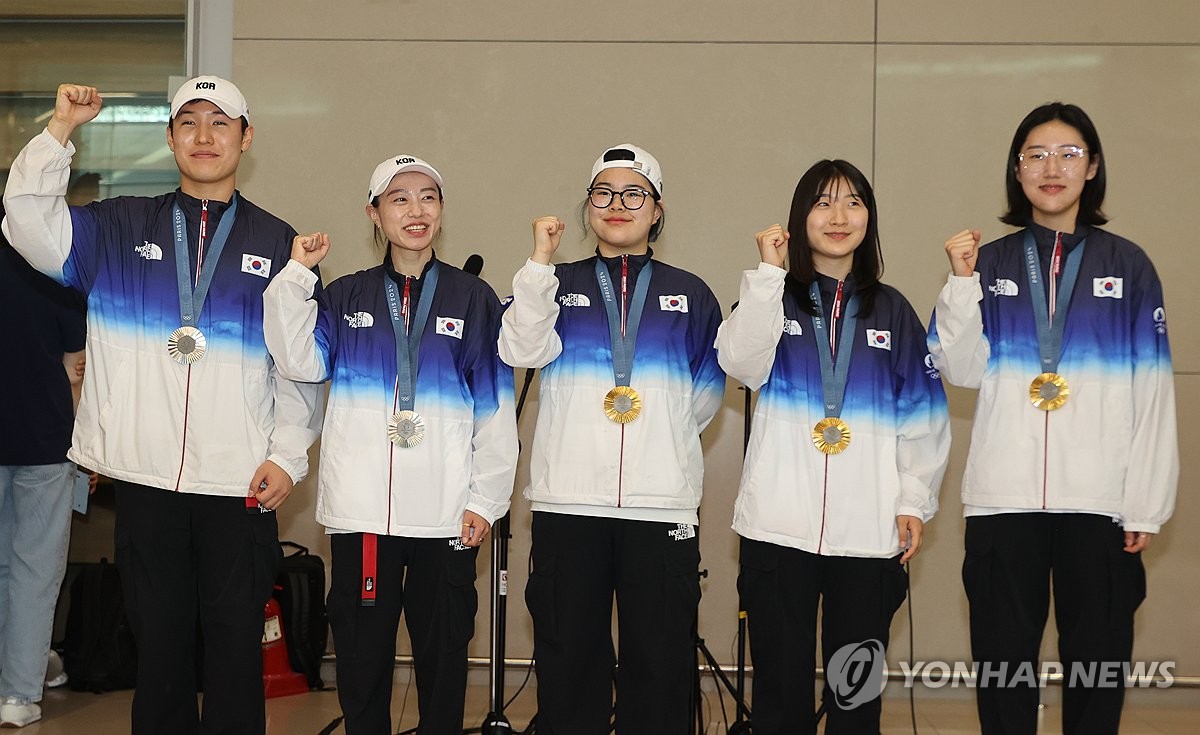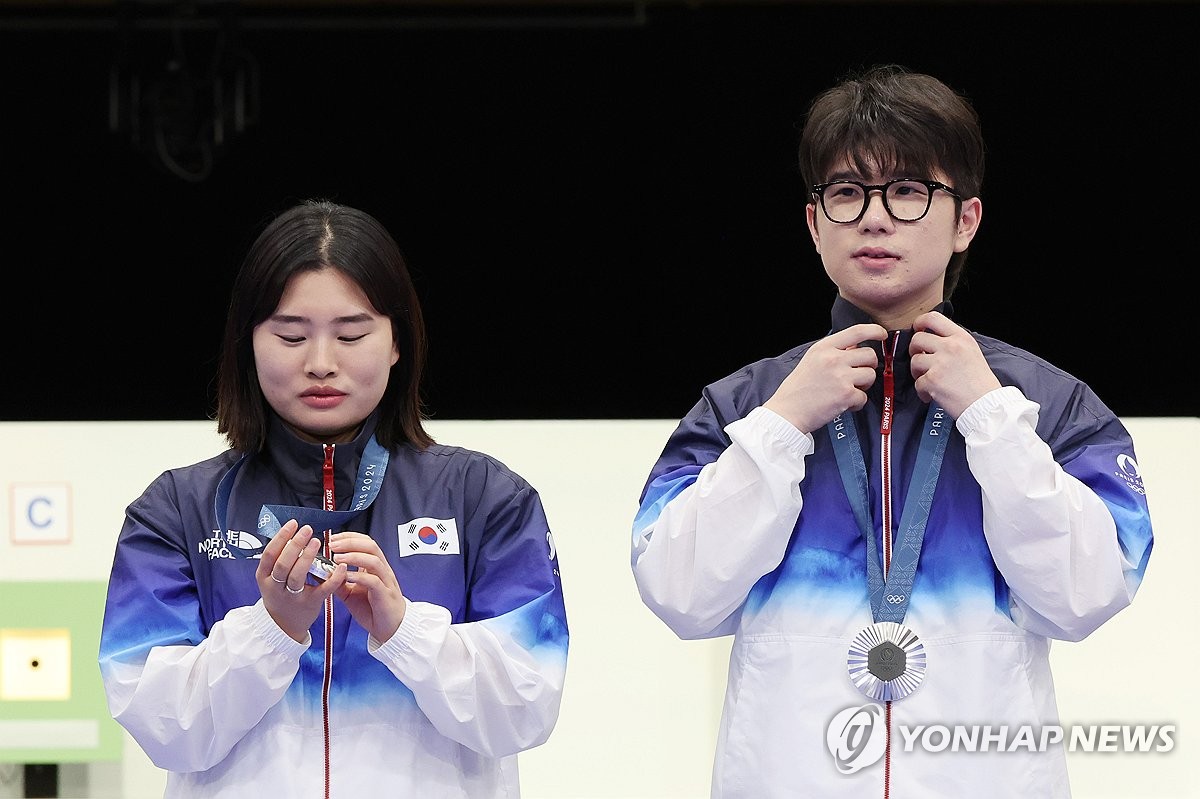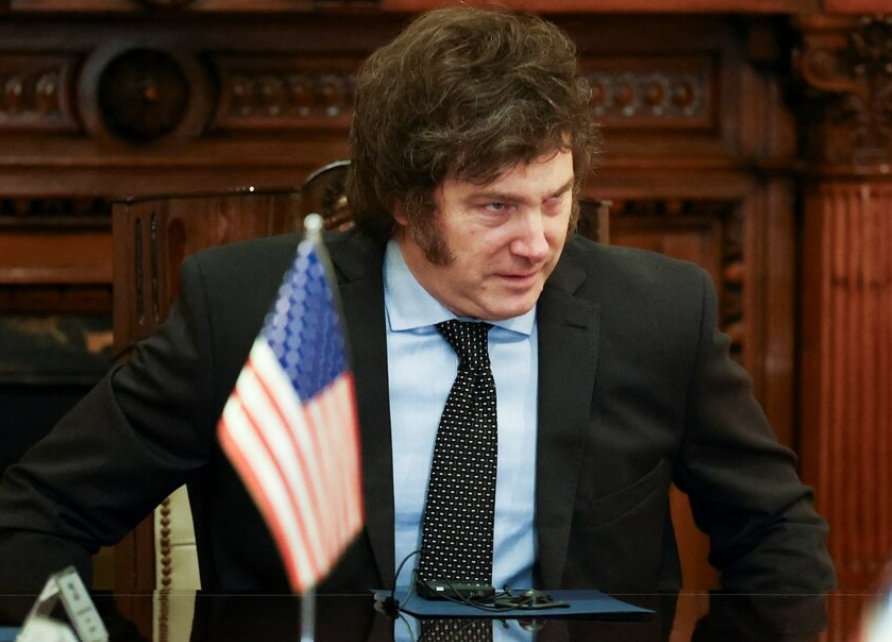Plan to pay rewards from the Shooting Federation fund… Currently undergoing approval review by the Ministry of Culture, Sports and Tourism

Shooting Team Medalist “Korea Shooting Fighting”
(Yeongjongdo = Yonhap News) Reporter Ryu Hyo-rim = The 2024 Paris Olympic shooting team is taking a commemorative photo after returning to Korea through Incheon International Airport on the 7th. From the left, 25m rapid fire pistol silver medalist Cho Young-jae, 10m air pistol silver medalist Kim Ye-ji, 10m air pistol gold medalist Oh Ye-jin, 10m air rifle gold medalist Ban Hyo-jin, and 25m pistol gold medalist Yang Ji-in. 2024.8.7 [email protected]
(Seoul = Yonhap News) Reporter Seol Ha-eun = The payment of prize money to shooting medalists who achieved the best performance ever at the 2024 Paris Olympics is being postponed indefinitely.
According to Yonhap News coverage on the 27th, the Ministry of Culture, Sports and Tourism is reviewing the Korea Shooting Federation’s request for approval to use basic assets to pay rewards to Olympic medalists from its own funds.
The Shooting Federation held a general meeting of delegates last month and decided to raise funds from the Federation Promotion Fund and give 315 million won in Olympic prize money to seven Olympic medalists and their leaders.
advertisement
The Federation Promotion Fund began to be accumulated by the Shooting Federation in the 1980s, and is currently known to have accumulated approximately 1.65 billion won.
The federation sent an official letter to the Korea Sports Council early this month, reporting that it would spend 400 to 500 million won from the federation’s promotion fund to pay rewards to medalists and also spend it on federation business expenses. The sports council reviewed the documents and responded that it was possible. .
A representative of the Sports Council explained, “If it is designated as an item that can be used in accordance with regulations related to basic property, such as carrying out a purpose business, it will be approved without any problem.”

Geumhyeon Geum and Hajoon Park ‘Proud Silver Medal’
(Chateauroux[프랑스]= Yonhap News) Reporter Lim Hwa-young = Geum-Hyeon Geum (left), who won the silver medal in the 10m mixed team final of the shooting air rifle at the 2024 Paris Olympics held at the Châteauroux Shooting Center in France on the 27th (local time), is looking at the medal on the podium. On the right is Park Ha-jun. 2024.7.27 [email protected]
The federation, which passed the Sports Council, requested approval for the use of basic assets from the Ministry of Culture, Sports and Tourism on the 7th.
The self-promotion funds of each federation or association are tied up as ‘basic assets’.
Since a pledge (security right) is placed on basic property, which is considered the ‘last bastion’, even if it is self-raised money, it cannot be used arbitrarily and must pass deliberation by the Sports Council and the Ministry of Culture, Sports and Tourism to be useful.
The federation planned to pay rewards to the medalists within this month if the Ministry of Culture, Sports and Tourism approves it, but it has not yet received final approval from the Ministry of Culture, Sports and Tourism.
An official from the federation said, “It is difficult to pay the reward right now. If the Ministry of Culture, Sports and Tourism approves it, we would like to pay it within this year if possible, but if it is delayed, it has no choice but to be postponed until next year. We are waiting for the final decision of the Ministry of Culture, Sports and Tourism.”
An official from the Ministry of Culture, Sports and Tourism said, “Basic property is money that must be kept for the operation of the association or federation, and it is not common to use basic property.” He added, “The background and validity of the federation’s application to use basic property due to unavoidable circumstances, “We are comprehensively reviewing and considering plans to cover future basic assets,” he explained.
He added, “Once the Ministry of Culture, Sports and Tourism gives final approval, the federation can use the basic assets immediately.”

The secret to success in the shooting Olympics…
(Paris = Yonhap News) Reporter Hwang Gwang-mo = Shin Myeong-joo, president of the Korea Shooting Federation, is talking about the secret to the 2024 Paris Olympics shooting success in an interview with Yonhap News at the Korea House in central Paris, France on the 1st (local time). 2024.8.2 [email protected]
Originally, the Shooting Federation planned to pay Olympic prize money with the 300 million won contribution that former president Shin Myung-ju promised when she took office last June.
However, after it became known that former Chairman Shin had delayed paying the wages of employees at the hospital he was running, he resigned without contributing the promised amount.
The Shooting Federation was verbally promised to pay contributions by former president Shin when he resigned, but it is unclear whether they will actually be able to receive the contributions.
Former Chairman Shin, who owed billions of won in unpaid wages, is said to be planning to repay by selling tens of billions of won worth of real estate.
However, according to legal principles, the priority is to sequentially repay the wages and severance pay of victims of wage arrears, national tax arrears, and unpaid amounts from the pharmaceutical and medical industry.
Payment of contributions by sport organizations is not a legal obligation, and the Shooting Federation did not leave any documents, such as a notarized memorandum, in relation to former Chairman Shin’s promise to pay contributions.
Report via KakaoTalk okjebo
Unauthorized reproduction/redistribution, AI learning and use prohibited>
2024/11/27 06:40 Sent

**How does the Korean Shooting Federation’s reliance on individual promises for athlete rewards, rather than a structured funding model, affect the principle of equity and fairness within the organization?**
## Reward Delays for Korea’s Shooting Stars: A Conversation
Welcome to World Today News’ in-depth analysis of the financial hurdles facing the Korean Shooting Federation in recognizing its Olympic heroes. We’re joined today by two distinguished guests:
**Guest 1:** Dr. Park, a sports economist specializing in Olympic funding models,
**Guest 2:** Lee Min-Ji, a former national shooter who represented Korea at the 2016 Rio Olympics.
**Section 1: The Promise Unkept: The Impact of Former Leadership**
* **Interviewer:** Dr. Park, the article mentions a significant funding shortfall stemming from a broken promise from former Federation President Shin. What are the wider implications of such a situation in terms of athlete trust and organizational stability?
* **Guest 1:** This situation underscores a critical vulnerability within sports federations reliant on individual promises rather than robust, transparent financial structures. It breeds mistrust and undermines faith in leadership, potentially deterring future support from athletes, sponsors, and the public.
* **Interviewer:** Lee Min-Ji, you’ve experienced firsthand the dedication and sacrifices required to compete at the Olympic level. How do you think this delay in rewards might impact the morale and motivation of current and future athletes?
* **Guest 2:** Delayed rewards are disheartening. They send the message that dedication and achievement aren’t sufficiently valued. This can demotivate aspiring athletes and make it harder to attract and retain talent, ultimately affecting Korea’s future Olympic performance.
**Section 2: The Bureaucratic Labyrinth: Navigating Funding Processes**
* **Interviewer:** The article outlines the complex process of securing approval for utilizing basic assets. Dr. Park, what are the inherent challenges in this system, and are there potential changes that could streamline this procedure while ensuring responsible management of federation funds?
* **Guest 1:** While safeguards are important, the current system can be excessively bureaucratic, hindering timely support for athletes. Exploring alternative funding mechanisms, such as endowment funds or dedicated government grants specifically for Olympic reward schemes, could offer a more efficient and sustainable solution.
* **Interviewer:** It’s stated that the Ministry is carefully reviewing the Shooting Federation’s request While meticulous review is essential, is there a risk of excessive delay, given the emotional and financial needs of the athletes?
* **Guest 2:** Delaying recognition for months, let alone a year, sends a disheartening message. While thorough review is understandably necessary, there should be a dedicated timeframe for reviewing such requests, ensuring prompt action following significant sporting achievements.
**Section 3: Looking Forward: Ensuring a Sustainable Future for Korea’s Shooters**
* **Interviewer:** This situation raises important questions about the long-term financial health of the Shooting Federation. Dr
. Park, what steps can be taken to establish a more resilient funding model that guarantees timely rewards and supports athlete development?
* **Guest 1:** A multi-faceted approach is crucial. Diversifying revenue streams through sponsorships, corporate partnerships, and public fundraising initiatives is essential. Additionally, developing comprehensive financial literacy programs for athletes and fostering transparency within the Federation can help build trust and ensure responsible resource management.
* **Interviewer:** Lee Min-Ji, what message would you convey to the young athletes hoping to follow in your footsteps, given the current characteristic?
* **Guest 2:** Do not let this situation deter your passion. We need dedicated individuals to challenge, learn, and excel in any circumstance. This setback highlights the need to advocate for athlete priority and a transparent, secure financial system. Our voices, combined with public support and thoughtful policy changes, can ensure a brighter future for Korean shooting.
**Closing Remarks**
This in-depth discussion emphasizes the critical need for a sustainable, transparent, and athlete-centered funding model to ensure the continued success of Korean shooting. Let’s hope for a swift resolution to this specific situation, which serves as a valuable lesson for the future of sports governance and athlete support.

